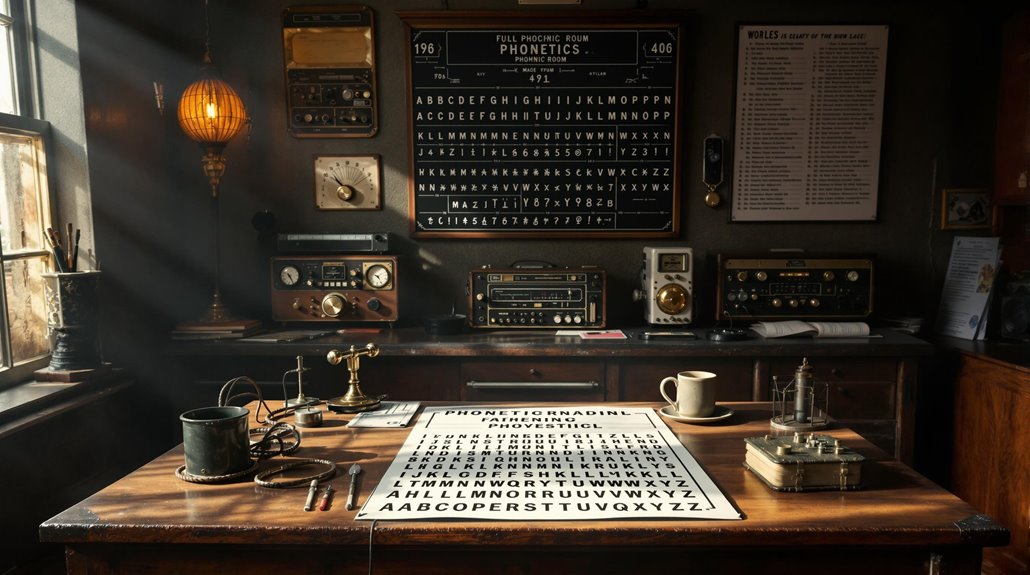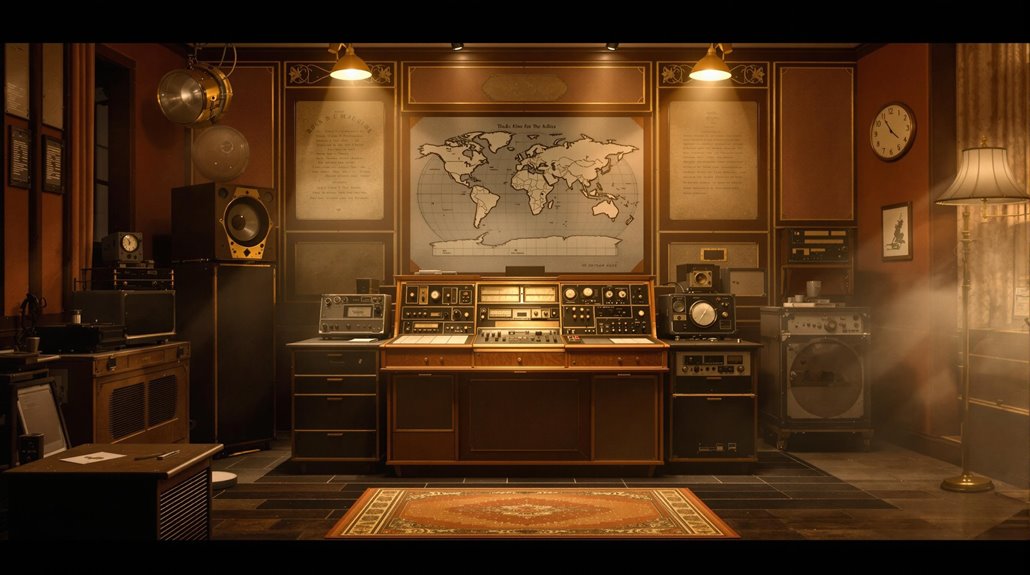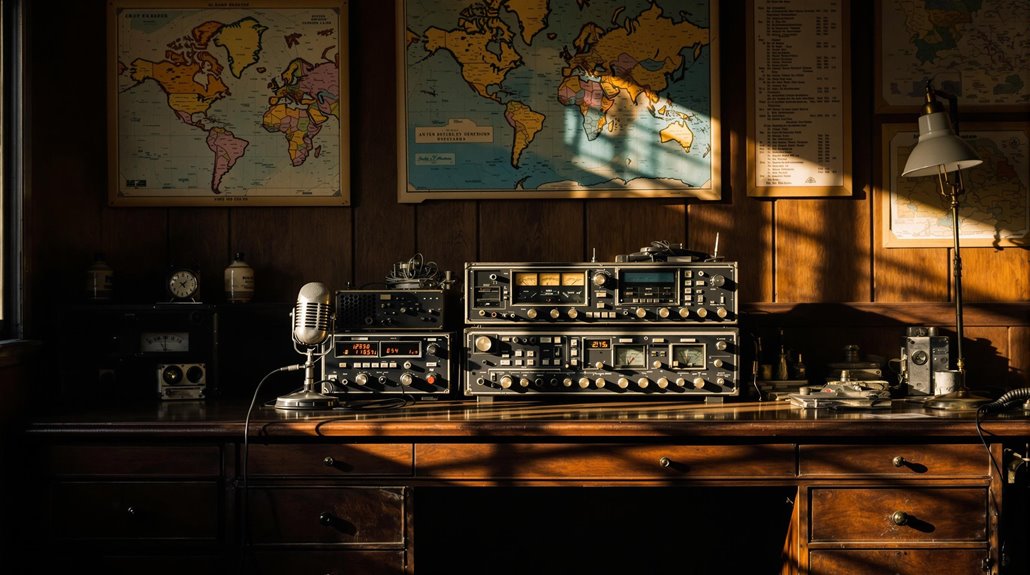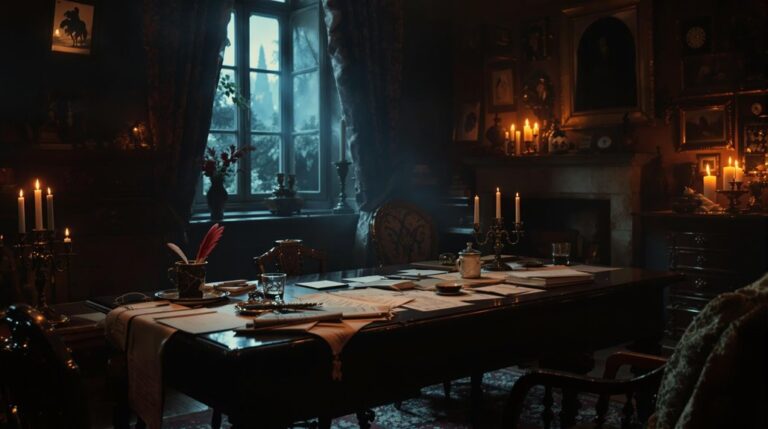WTF: The NATO Alphabet’s Quirky Origins
You've probably ordered a pizza over the phone without thinking twice, but during World War I, a misheard message could mean life or death. That's where the NATO phonetic alphabet's strange journey begins. What started as a jumble of competing systems—including the peculiar "Ack Beer" method—evolved into today's carefully crafted code words. You'll find that behind each familiar term like "Foxtrot" and "Whiskey" lies a fascinating tale of linguistic science and cultural compromise.
From WWI's "Ack Beer" to Modern Standards

When radio communication first emerged in the early 20th century, operators quickly realized they needed a standardized way to spell out letters clearly. The phonetic evolution began in 1913 when the International Telecommunication Union created the first system using city names like Amsterdam and Baltimore. In 1956, a major milestone was reached when NATO officially adopted the standardized alphabet. You'll find the path to communication clarity wasn't straightforward. The British Royal Navy switched to "Apples, Butter, Charlie" in 1917, while the U.S. Army Signal Corps developed their "Able, Baker, Charlie" version in 1941. This standardization became especially vital as radio communication played a crucial role in coordinating military operations during World War II.
The Chaotic Wartime Spelling Soup
The wartime military landscape was a jumble of competing phonetic alphabets that would make any modern radio operator's head spin.
You'd find British forces using "Ack" and "Beer" while their Navy communicated with "Apples" and "Butter," creating endless communication confusion during joint operations.
While the British Army started with just seven words, they'd expanded to 26 by 1918.
You can trace the alphabet evolution through various attempts at standardization, from the ITU's city-named system in 1927 to the game-changing Joint Army/Navy alphabet of 1941.
Even then, you'd encounter different systems depending on where you were – the RAF kept their own alphabet until 1956, while South American operators used yet another English-based version.
The creation of the Combined Communications Board in 1941 finally brought some order to the chaos by working to standardize communication between US and British forces.
The International Civil Aviation Organization took charge in 1951 to create a truly universal system that would work across all languages and accents.
It was truly a linguistic soup of military communication.
Science Behind the Perfect Words
Creating NATO's phonetic alphabet wasn't just guesswork – it required rigorous scientific methodology to select each perfect word. Scientists tested candidate words across 31 nations, focusing on both phonetic clarity and cultural resonance.
They needed words that would work seamlessly in English, French, and Spanish while being crystal-clear over crackling radio transmissions. The system requires JavaScript enabled for optimal learning on modern training platforms.
You'll notice clever tweaks that showcase this scientific precision. "Alfa" uses an 'f' instead of 'ph' to prevent pronunciation confusion, while "Juliett" sports an extra 't' to help French speakers.
Every word had to pass strict criteria: matching initial letters, avoiding offensive meanings, and maintaining similar spellings across languages. The alphabet became globally standardized in 1956 to ensure consistent communication across borders.
Even under intense noise conditions, each word needed to stand distinct from the others – a proof of the careful research behind this global standard.
How "Charlie" Beat Out "Coca" and Other Near-Misses
Behind today's familiar NATO phonetic alphabet lies a fascinating battle of words that shaped the final selection. You might be surprised to learn that your trusted "Charlie" wasn't the original choice – "Coca" almost made the cut instead.
The word selection criteria focused heavily on phonetic clarity across multiple languages and radio conditions. Extensive comprehension tests involving multiple nationalities helped determine which code words would make the final cut. The International Telecommunication Union first established official phonetic codes in the 1920s, paving the way for future improvements.
When choosing between competing words, officials rigorously tested each option. "Metro" lost out to "Mike," while "Nectar" couldn't quite beat "November."
Some changes stuck immediately, like swapping "Union" for "Uniform." Others saw brief alterations – NATO briefly changed "X-ray" to "Xray" before reverting back.
Each choice had to work well for English, French, and Spanish speakers while remaining clear over noisy radio channels.
Why Some Letters Got Special Treatment ("Alfa" and "Juliett")

Among NATO's carefully selected code words, "Alfa" and "Juliett" stand out for their unconventional spellings – modifications that reveal how deeply NATO considered international communication needs.
You'll notice "Alfa" swaps the traditional "ph" for a simple "f," ensuring phonetic clarity across languages where the "ph" combination might cause confusion. This clever adjustment makes the word instantly recognizable to non-English speakers who might stumble over "ph" pronunciation.
"Juliett" got special treatment too, with an extra "t" added specifically to prevent French speakers from falling silent on the final consonant. The system was designed to avoid misunderstandings in radio and telephone communications. Emergency services personnel rely heavily on these standardized pronunciations to convey critical information clearly.
These thoughtful tweaks showcase NATO's commitment to linguistic diversity and their goal of creating a truly international system. Both modifications emerged from NATO's 1956 standardization efforts, proving that sometimes breaking spelling rules serves a higher purpose.










